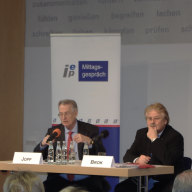IEP Lunch Debate with Elmar Brok, MEP: “Megatrends in European Integration”

Elmar Brok, MEP, Chairman of the Committee on Foreign Affairs of the European Parliament, spoke about “Megatrends in European Integration” during the Institute for European Politics’ (IEP) Lunch Debate on December 4, 2015 at the Representation of the State of Saxony-Anhalt in Berlin. The discussion was opened by a short welcoming speech from Dr. Michael Schneider, State Secretary for Federal and European Affairs as well as envoy of the state of Saxony-Anhalt to the Federation, and moderated by Prof. Dr. Mathias Jopp, director of the IEP.
Although very different topics could be addressed when talking about “Megatrends in European Integration” at the Lunch Debate, Elmar Brok focussed on a few, vital challenges Europe and the European Union (EU) are currently facing. Not surprisingly, Brok spoke about the great flow of refugees to Europe and particularly directed attention to its fundamental causes. According to him, the EU’s great appeal for people from outside the Union — as an area of peace for decades, high prosperity, and comprehensive social protection systems, together with the modern media’s coverage and speed — is the decisive factor for people to set out for the exhausting journey to Europe. Thus, migration will not decline unless the situation of the people in their home regions has been improved.
As the second important challenge to European integration, Elmar Brok talked about Europe’s future role in the world. In the context of the Trans-Pacific Partnership (TPP), signed at the beginning of October, he stressed Europe’s insignificance seen from a Pacific perspective and warned a nationally fragmented Europe would be marginalized by the great powers, such as the USA and China.
In order to exert influence on these and other megatrends, it is crucial to realize what politics on a certain level is actually able to execute successfully, Brok said. Thus, the member states need to honestly contrast their interests and wishes with their own potentials and thereby acknowledge that certain interests can only be realized on a European level, although this might mean making a compromise. Hence, it is better to get 60 percent of the national interest by way of European cooperation than getting zero percent by trying it only on a national level.
As Brok highlighted during the discussion with the audience, he is under no illusions that even if European states would solve more problems on a European level, European integration would make large leaps forward. Great integration progress is highly unlikely because of the large number of current member states and the several levels of unanimous approval (governments, parliaments, if necessary referenda) necessary for it. Thus, his proposal is to extend European integration within the borders laid out by the current treaties as far as possible.
Forcefully, Elmar Brok argued for an earlier inclusion of citizens in the political process when dealing with megatrends in European integration. This means conducting broad discussions about causes of megatrends and ways to deal with them. Thereby, populism that benefits from ignorance and scarce participation could be prevented.
By Martin Pötzsch





